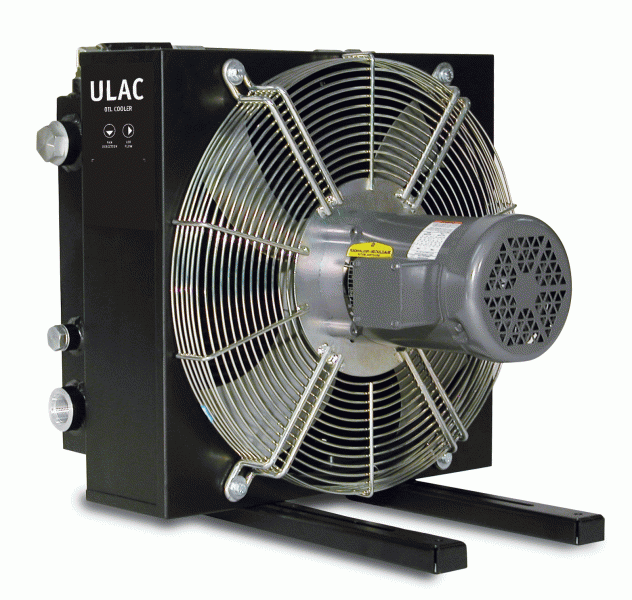
High temperatures lead to deterioration of the fluid in the system, but also damage the seals, orings in the components, and hydraulic hoses. According to the seal manufacturers, if the operating temperature exceeds the recommended value by 10 degrees celcius, the seal life is reduced by 80 %. Using a suitable oil cooler in the system extends system life, reduces internal leakage, provides more efficient operation and enables lower maintenance costs. Air-cooled oil coolers are commonly used in mobile applications, and water-cooled oil coolers may be preferred in systems where the operation is more intensive.
Heat kills hydraulic systems. That’s why hydraulic oil coolers are widely used in a diverse range of agricultural, mobile, manufacturing, and industrial settings. They remove excess heat generated by energy losses in a system, as well as that from external sources such as engines, furnaces, and even the surrounding environment.
In fact, coolers are often essential for designing temperature-optimized hydraulic systems that keep oil temperatures within a limited range. Such circuits are basic prerequisites for cost-efficient operation, as they provide a number of performance, economic, and environmental benefits. These include:
- Maintaining the correct temperature keeps oil at its recommended viscosity, ensuring mechanical components are properly lubricated and hydraulic devices run at peak efficiency. Letting oil temperature rise beyond recommended limits can reduce the life of a system due to poor lubrication, higher internal leakage, a higher risk of cavitation, and damaged components.
- Keeping temperatures down also helps ensure the oil and other components last longer. Excess heat can degrade hydraulic oil, form harmful varnish on component surfaces, and deteriorate rubber and elastomeric seals.
- Operating within recommended temperature ranges increases a hydraulic system’s availability and efficiency, improving equipment productivity.
- Finally, with more machine uptime and fewer shutdowns, it reduces service and repair costs.
Considering the benefits coolers offer, it’s apparent that accurately sizing them is a paramount concern for design engineers. Undersizing obviously allows higher-than-recommended oil temperatures. But oversizing hurts system efficiency as well, by reducing temperatures below the recommended range and increasing costs with a larger-than-necessary purchase. Here are some tips on selecting the right type and size cooler for a specific application.
Cooler options
Several different types of coolers are suitable for hydraulic systems, with air and water cooled being the most common.
Air-cooled systems dissipate heat with flowing air. This type of cooler operates by forcing cold air over hot fluid inside a heat exchanger’s coil or core. Low running cost and simple maintenance are attractive benefits of air-cooled systems. They also eliminate water-contamination problems and minimize corrosion. Additionally, heat generated from air-cooled systems can be used for other purposes.
On the downside, the upfront expense of an air-cooled system exceeds that of a water-cooled unit. Air-based versions are also larger and generate more noise, so they can degrade the work environment. What’s more, these coolers require ventilation and clean air, and variations in ambient temperature can greatly affect cooling capacity — making steady-state operation more difficult to maintain.
Water-cooled systems use cold water to remove heat, with hot and cold fluids separated by a barrier. Compared to air-cooled systems of equivalent capacity, water-cooled systems have lower up-front costs. They’re also quiet, compact, and do not alter the surrounding ambient temperature. Variations in air temperature have little or no effect on cooling capacity, which allows for greater consistency. Meanwhile, the system’s heated water can be used for other on-site purposes.
Although water-cooled coolers cost less, they generally require clean water. Continuously running water can be expensive, leading to higher operating costs. Other concerns include risk of corrosion and erosion and increased maintenance. Water-cooled units can also freeze in cold weather, letting water contaminate the oil.

